本文目录
介词短语做状语修饰句子
介词短语作状语(百度贴来的,
A)介词短语作状语,用来修饰动词.
例如:
We live quite near my office.(地点)
Who knows what will happen in the future?(时间)
The sewing machine is worked by foot.(方式)
We're waiting for them to arrive for lunch.(目的)
He worked himself to death.(结果)
He is so useful to me that I can't do without him.(条件)
With all your faults,I still like you.(让步)
He lay on his bed with the sunlight falling on his face.(伴随状语)
I don't believe in dream.(范畴)
What country do you come from?(来源)
Everything depends on whether he is punctual.(根据)
The men who govern the country are chosen by the people.(行为者)
B)介词短语作状语,用来修饰形容词
例如:
He was not conscious of my presence in the room.
I am not interested in doing business with that firm.
They are proud of their clever children.
C)介词短语作状语,修饰副词(比较少用)
例如:
John is now somewhere on the high seas,and we wish him a pleasant holiday.
Do you live here in Middle Town,Mr John?
D)介词短语作状语,修饰整个句子
例如:
On the whole,Jack has been a good friend.
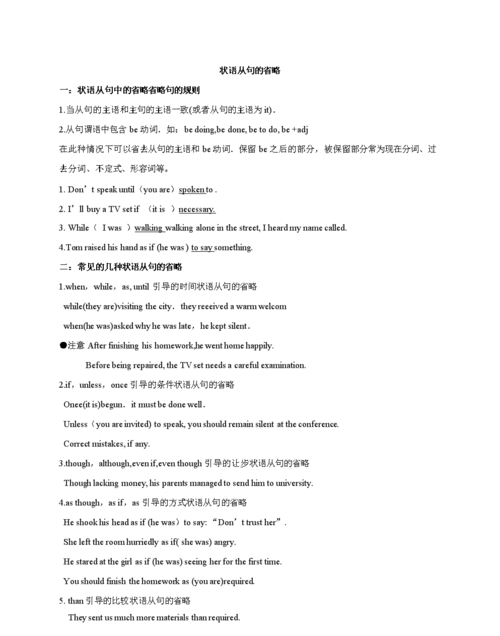
主谓补结构的英语句子
如下:
1.He runs fast他跑得快
he是主语 runs是谓语动词 fast 副词做状语
2. He gets up early in the morning.他早上早起
he是主语 get up 动词短语作谓语 early in the morning作状语
3.She is crying sadly 她哭得很伤心
she是主语 is crying是谓语 sadly是状语
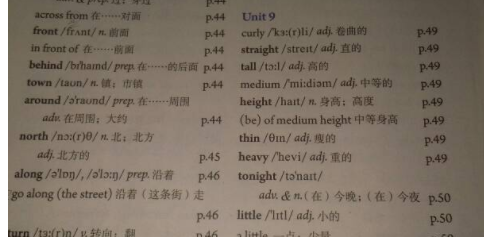
4.She sings well她唱得好
she是主语 sings是谓语 well是状语
5.She sits behind me.她坐我后面
she是主语 sits是谓语 behind me是状语
状语的构成
经常充当状语的有形容词,副词,时间处所名词,能愿动词,指示代词,以及方位短语、介词短语、动宾短语、谓词性联合短语、谓词性偏正短语、谓词性主谓短语等。
含有动量词的数量短语以及重叠式的数量短语(不论动量,物量)也可以充当状语。
此外,少数名词带上表比况的助词也可以作状语。
过去分词作时间状语的例句英语
一、过去分词作状语表示被动的和完成的动作。
1.Written in a hurry,this article was not so good!
因为写得匆忙,这篇文章不是很好。
2.Lost / Absorbed in deep thought,he didn't hear the sound.
因为沉溺于思考之中,所以他没听到那个声音。
二、过去分词作状语时其逻辑主语为主句的主语,此时应注意人称一致;
1.Given another hour,I can also work out this problem.
再给我一个小时,我也能解这道题.(given 为过去分词作状语,它的逻辑主语为主句主语 I,即 I 被再给一个小时。)
2.Seen from the top of the hill,the city looks more beautiful to us.
从山顶看城市,城市显得更漂亮。(seen 为过去分词作状语,表"被看",由语境可知,它的逻辑主语必须是城市,而不是"我们",因为"我们"应主动看城市。)
需要注意的是:如果过去分词作状语时,前面再加逻辑主语,主句的主语就不再是分词的逻辑主语,这种带逻辑主语的过去分词结构实际上属于独立主格结构。
3.The signal given,the bus started.
信号一发出,汽车就开动了。(the signal 是 given 的逻辑主语,因此主句主语 the bus 就不是given 的逻辑主语。
4.Her head held high,she went by.
她把头昂得高高地从这儿走了过去。(her head 是 held high 的逻辑主语,因此主句主语 she 就不再是held high 的逻辑主语。)
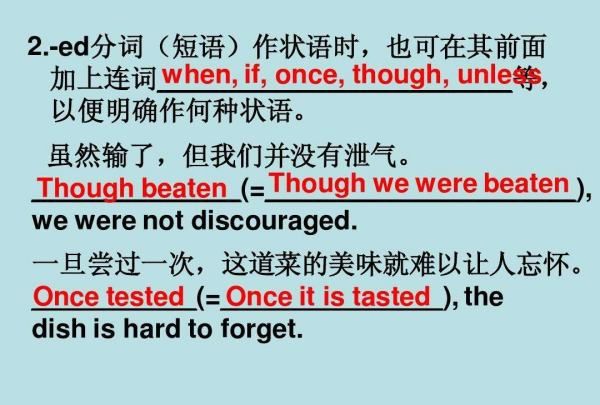
1.Caught in a heavy rain,he was all wet.
因为淋了一场大雨,所以他全身湿透了。 (caught in a heavy rain 为过去分词短语作原因状语,它来源于原因状语从句Because he was caught in a heavy rain.)
2.Grown in rich soil,these seeds can grow fast.
如果种在肥沃的土壤里,这些种子能长得很快。( grown in rich soil 为过去分词作条件状语,它来源于条件状语从句 If these seeds are grown in rich soil.)
四、过去分词作状语的位置.过去分词可放在主句前作句首状语,后面有逗号与主句隔开;也可放在主句后面,前面有逗号与主句隔开。
He stood there silently,moved to tears. = Moved to tears,he stood there silently.
他静静地站在那里,被感动得热泪盈眶。
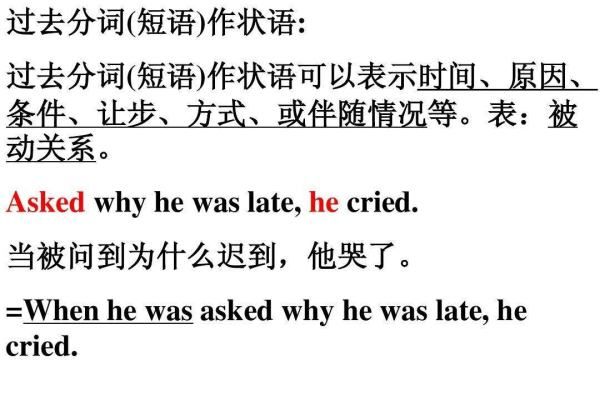
初中英语从句时态用法
英语时间状语从句讲解与练习 引导时间状语从句的普通类从属连词有when(当……时),while(在……期间),as(当……,一边……一边……),before(在……之前),after(在……之后),since(从……以来),till/until(直到),whenever(无论何时),as soon as(一……就)等。如: When I went into the classroom, he was reading. 当我走进教室时,他正在看书。 He read a newspaper as he went along. 他边走边看报纸。
We must strike while the iron is hot. 我们必须趁热打铁。
I will tell you after they leave. 等他们走后我再告诉你。
I told him to come back whenever he wants to. 我告诉他什么时候想回来就回来。 I waited till/until she was back. 我一直等到她回来。
Once time is gone, you will never get it back. 时间一旦失去就再也得不到了
注意:在时间状语从句中,不能用一般将来时、过去将来时态或将来完成时,而要用相应的一般现在时态、一般过去时或现在完成时来代替。如:
I’ll telephone you as soon as I get there. 我一到达那里就打电话给你。
She said she would phone me as soon as she got there. 她说她一到达那里就给我电话。
Don’t get off the bus until it has stopped. 等车停稳后才下车。
when, while 和 as 引导时间状语从句的用法
这三个词的意思很简单,都有“当……时候”的意思。但学生经常会问三个词的区别在哪儿,特别是在做选择题的时候。别说是学生,就我个人而言,做这样的选择题要保证百分之百的正确也是不可能的。现根据大量的实例和个人的思考,做一点小结,供大家参考。
一、when 的用法
如果只从现象来看,when 从句用的最多的是一般过去时,而主句的时态没有限制,根据具体情况而定。
1. When he was a child he was always trying out new ideas.
他小时候就常常试验一些新的设想。
2. When she came into my room, I was just reading a book. 她走进我房间时,我正在看书。
3. Were you writing when the teacher came in? 老师进来的时候,你在写信吗?
4. Sorry, I was out when you called me. 对不起,你打电话来的时候我出去了。
5. He was on the point of leaving when someone knocked at the door.
他正要走,这时有人敲门。
6. I thought of it just when you opened your mouth. 就在你要说话的时候,我也想到了。
7. I had hardly[scarcely] closed my eyes when someone knocked at the door.
我刚一闭上眼,就有人在敲门了。
根据以上的例句,我们可以总结出一点:when 从句的A事件,相当于另一个事件B发生的时间点。也就是说,when 从句的重点不在动作本身发生的状态,而只是把它作为一个时间点,所以when 多数情况下用的是一般过去时,则不用正在进行时。因为如果用正在进行时,它表示的就是一段时间而不是一个时间点了。根据这一点,有的文章补充说:when 从句的动词大多是瞬时动词。这种说法也可以参照。 实际上,when 从句也可以有其它的时态,但几乎也不用进行时,因为它也只是作为一个时间参照点。例如:
1. When I got to the airport, the guests had left. 当我赶到飞机场时,客人们已经离开了。
2. When he had finished his homework, he took a short rest.
1/10
当他完成作业后,他休息了一会儿。
3. Why do you want a new job when you have got such a good one already?
你已经找到如此好的工作,为何还想再找新的?
4. You shall borro
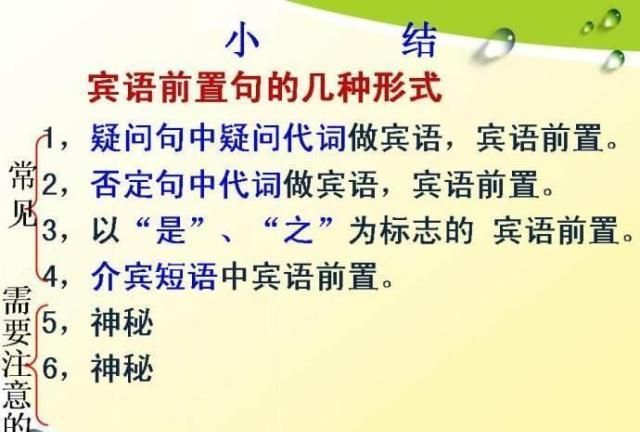
以上就是关于英语状语前置句例句简单,介词短语做状语修饰句子的全部内容,以及英语状语前置句例句简单 的相关内容,希望能够帮到您。

